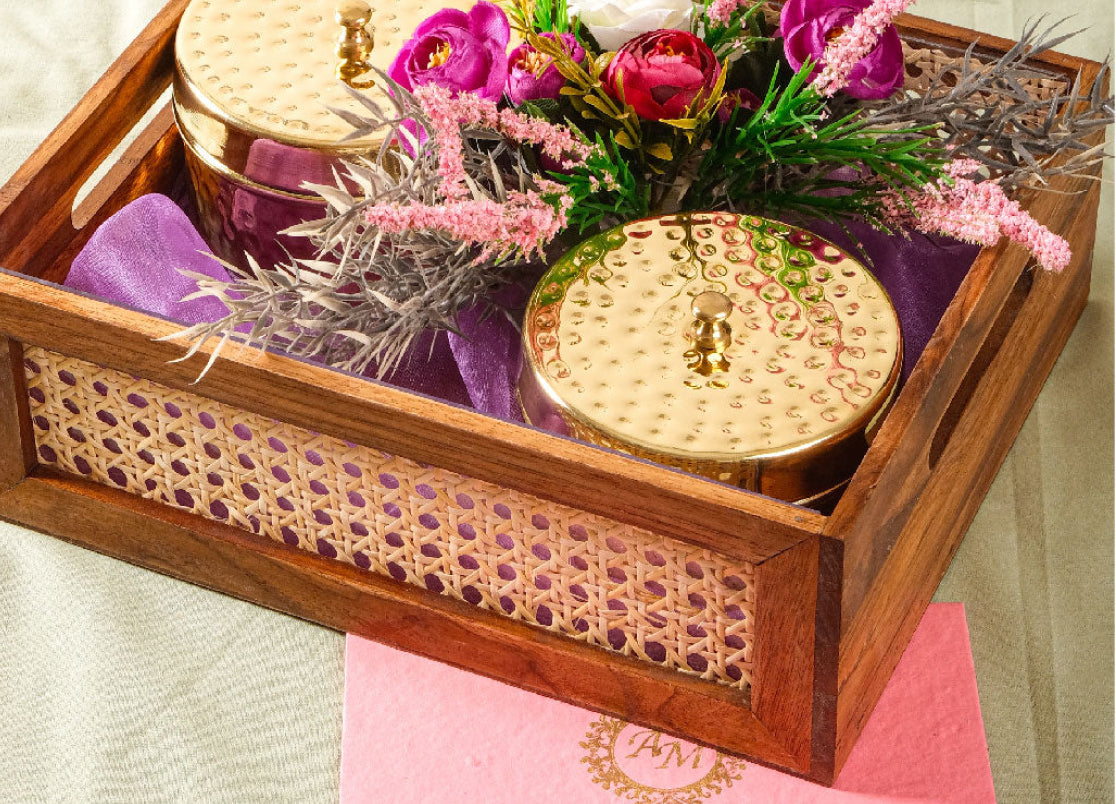Your 10 Benefits of Cooking in Brass Utensils!
Cooking in brass utensils is something that has been around for a while. It has been a part of our magnificent history. There have been several reasons for the same. While one may feel that the shine and richness of brass could be a reason for it becoming a choice amongst the royalty or so, at the same time, there are factors like durability, extreme health benefits and others that also make it an option for the commoner.
Read below to understand
the crucial benefits of cooking in brass utensils:
1. Even heat distribution:
Brass is a copper and zinc alloy. Copper is an excellent conductor of heat. When used in cookware, brass quickly and efficiently transfers heat from the heat source to the food. The consistency in the thickness of brass contributes to even heat distribution. It helps prevent hot spots in cookware with uneven thickness, ensuring that all utensil parts receive and transfer heat consistently. Whether you're frying, sautéing, or simmering, the food is exposed to consistent heat, reducing the likelihood of unevenly cooked or burnt portions. A brass kadhai thus becomes a great choice for cooking vegetables.
2. High heat retention:
Brass is a copper and zinc alloy. Copper is an excellent conductor of heat. When used in cookware, brass quickly and efficiently transfers heat from the heat source to the food. The consistency in the thickness of brass contributes to even heat distribution. It helps prevent hot spots in cookware with uneven thickness, ensuring that all utensil parts receive and transfer heat consistently. Whether you're frying, sautéing, or simmering, the food is exposed to consistent heat, reducing the likelihood of unevenly cooked or burnt portions. A brass kadhai thus becomes a great choice for cooking vegetables.

3. High Durability:
The composition of copper and zinc gives brass utensils a solid and durable structure, capable of withstanding everyday wear and tear in the kitchen. As corrosion-resistant, brass utensils can be a long-lasting solution to kitchen woes. With regular and straightforward cleaning, cooking with brass utensils is a lifetime joy. Brass utensils are less prone to scratches, dents, or other damage that can occur during regular cooking activities and cleaning
4. The glossy look:
No one can hide brass utensils' beauty and aesthetic appeal. They have an attractive appearance, and with modern designs, they also become a fantastic combination of tradition and fashion. Many brass utensils are crafted with attention to detail and precision. Artisanal craftsmanship often results in unique and intricate designs, enhancing the overall aesthetic appeal of the utensils. The artistic elements make them stand out as functional tools and decorative pieces.
5. Enhanced Digestion:
Brass utensils are alkaline; some believe this property may aid digestion. Alkaline foods are thought to neutralize excess stomach acid, helping with digestive problems. Foods cooked in alkaline utensils can help balance the body's pH levels, potentially aiding digestion.

6. Trace Minerals:
Brass is an alloy composed of copper and zinc. Cooking in brass utensils may also introduce small amounts of these minerals into the food. Copper and zinc are essential trace elements in various physiological processes, such as immune function and enzyme activity.
7. Healthy hair and glowing skin:
The element of copper in brass utensils helps regulate blood flow and, in turn, imparts a natural glow to the skin—also, the traces of zinc act as a solution to prevent hair and skin problems. There is enough nourishment in these trace elements that enter food when it is cooked in brass utensils.
8. Builds Immunity:
There is enough zinc in brass utensils that becomes the backbone for developing immunity. Brass has natural antibacterial properties, and using utensils made of this material may contribute to a more hygienic food preparation process. No wonder, since historical times, elders have been seen drinking water from brass glasses or eating food with brass utensils.

9. Natural Non-Stick Properties:
Over time, a layer called patina forms on the surface of brass utensils. When properly maintained, this layer can act as a natural non-stick coating, reducing the need for excessive amounts of oil or fat in cooking. The patina on brass has a smooth and slightly oily texture, creating a naturally occurring non-stick surface. It acts as a barrier between the brass and the food being cooked. This helps minimize the reactivity of brass with acidic or alkaline ingredients, reducing the risk of metallic tastes in the food. It can be particularly beneficial for cooking items like pancakes, eggs, and delicate foods prone to sticking on less smooth surfaces.
10. Promotes weight loss:
You may not know this, but the copper traces of brass utensils aid in weight loss and fight obesity. It is one way of helping you maintain your weight loss regimes.
While traditional practices and cultural beliefs often contribute to using brass utensils, it's crucial to make informed choices based on scientific evidence and individual health considerations. One must understand the choice of cooking utensils and use brass utensils in daily cooking for a healthier life. Check out the video for more information on the uniqueness of brass and copper utensils!
